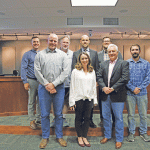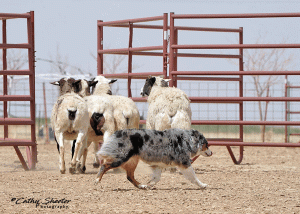A matter of trust: resolving conflicts over wolf reintroduction, part 1
Photo courtesy of Dick and Leslie Sorensen
By Robin Ferruggia
The Surveyor
Part one of a three-part series.
The federal government made a mistake.
They didn’t listen to the adamant objections from the states in the Yellowstone National Park area where they planned to reintroduce the Canadian gray wolf under the Endangered Species Act in the early 1990s.
Phillip Batt, then governor of Idaho, threatened to call out the National Guard to remove the wolves from the state after the federal government refused to honor his request to stop their release.
After the wolves were released regardless, the Wyoming Farm Bureau and others filed unsuccessful lawsuits opposing the reintroduction.
In addition to fears related to livestock depredation, and as saving species involved protecting their habitat, some livestock producers feared the reintroduction was going to be used to control land and water and push them off their lands.
Eventually, federal officials admitted that it was a mistake to not listen to the area stakeholders, but the damage had been done. They had lost the trust of these communities, exacerbated their anxieties and fears of loss, and created an untenable sense of powerlessness to protect their own property and livestock operations.
Understandably, their anger and frustrations were directed at the wolves and wolf reintroduction.
“Put yourself in the other guy’s shoes,” said Leslie Sorensen, a Colorado rancher currently raising hay and Dorper sheep in Weld County.
The Sorensens have lost three guardian dogs who were also beloved pets to wolf depredation.
“She gave her life for me,” Sorensen said. “Guarding my sheep! Wolves came in and slaughtered several and her just for killing sake itself. She was my closest, best buddy. Slept by my bed at night and warned of all who came, except the last night, when she didn’t come in at bedtime and wouldn’t come when I called. I was too tired to go look for her. It was the last time I would call her name.”
When Sorensen reported the killing of her dog, wildlife officials told her they were sorry for her loss, and said it was “just a dog,” she said. “I cried when she was killed, but she was only a dog? Spell dog backwards.”
“There is a level of trust to be earned here by Colorado Parks and Wildlife (CPW),” said Ashley House, vice president for strategy and advocacy for the Colorado Farm Bureau. “It’s definitely going to be a tenuous situation for a while. When the first lethal take happens people will be cautious and on alert regarding how CPW approaches a lethal take and how the public will respond.”
Although the Colorado Cattlemen’s Association and the Gunnison County Stockgrowers Association filed a lawsuit in the United States District Court, District Court of Colorado, on Dec. 15, 2023, a request for a temporary restraining order prohibiting the U.S. Fish and Wildlife Service and CPW from reintroducing wolves into Colorado was declined.
The lawsuit alleged that USFWS failed to adequately review the Colorado Wolf Restoration and Management Plan.
Consistent with the plan and Colorado state law, several wolves taken from Oregon have now been reintroduced into the state.
“Another entity, the Colorado Conservation Alliance, filed a complaint seeking to enjoin further wolf releases on Dec. 14. This group’s complaint rested on different legal grounds than the Gunnison/Cattlemen’s lawsuit. They filed a motion for preliminary injunction on Dec. 22 asking the court to halt wolf releases pending a decision on the merits of their claim. A hearing on the motion was scheduled for Jan. 30, but upon learning that CPW was not planning to bring in any more wolves until December 2024, the court vacated the scheduled January hearing and rescheduled it for May 4, 2024,” said Travis Duncan, public information supervisor for CPW.
“There was a lot of anxiety before the release of the first five,” said House. “There are many unknowns. How will it play out? Ranchers and farmers in Routt and Moffat Counties are seeing them and already dealing with conflicts with dogs. Seeing them close to sheep and cattle is elevating the threat level. It’s becoming real, very present.”
Livestock producers “are worried about public perceptions of how they will be viewed when dealing with wolf/livestock conflicts.”
They fear public retaliation if they make a claim for depredation, harassment or herd loss, she said. “No rancher wants to be the first who submits a report for compensation.”
In Washington state, the Farm Bureau had to fight to get the names of folks who received compensation removed from the record, she said. “Nobody wants arrows pointing back to them.”
They fear wolf advocates and the wildlife conservation community might vilify them on the internet or social media, label them as wolf killers, or come onto their private property to protest, she said. Reports of protestors coming into their “private space” have been reported by Farm Bureaus in Washington and Oregon states. Protestors came onto the private property of a female legislator who testified against wolves in a wolf legislation hearing in Washington to passionately object to her remarks at the hearing.
“It’s causing lots of anxiety,” said House.
Livestock producers are facing many stressors and wolves are just one more.
Rising costs for farm operations, rising inflation, drought, precipitation, snowfall, and profits getting thinner every year leave them wondering if they will still be in business a year from now and if their children will ever be able to inherit the business.
The cost of implementing non-lethal control methods is “not insignificant,” she said and will be a strain on an already difficult financial environment.
Non-lethal wolf is required by CPW except in certain circumstances when it may be legal to kill a wolf under the Endangered Species Act’s 10(j) rule.
But, help is available.
There are programs, many financed by the United States Department of Agriculture, that will help ranchers and farmers with costs as well as mental health services to help them handle the stress and anxieties caused by wolf reintroduction.
“Not a lot of ranchers know about them, how to access the funds or if they are eligible,” said House. “As we deal with this new reality of dealing with wolves, more programs will be available, and will provide meaningful impacts.”
The Colorado Department of Agriculture (CDA) and CPW signed a memorandum of understanding that will enable them to work together to help farmers and ranchers.
“CPW and CDA are focused on working together to make sure ranchers know what they can and cannot do when they encounter wolves on their properties,” said Olga Robak, director of communications and public awareness at CDA. They are going to get more staff and work together to train livestock producers to use non-lethal control methods, how to prevent conflict to begin with, and what to do if they
have depredation or the threat of it, she said.
“We’re going to make sure people can get support in their own communities, from range riders and get help as needed. We will provide technical assistance, such as how to install fences and in the use of other non-lethal control tactics and practices. CPW is still working on developing a full definition of when is it depredation that requires lethal methods and how to implement them.”
The USDA-funded Regional Conservation Partnership Program (RCPP) provides help to expand access to mental health services. Governor Polis has also included a budget proposal to help ranchers and
farmers, and there are bills pending in the state legislature that may also provide assistance.
For more information, please contact:
https://www.caamhpforhealth.org/
https://www.nrcs.usda.gov/programs-initiatives/rcpp-regional-conservation-partnership-program#contact
Pending legislation:
SB 24-055 Behavior Health in Ag (Colorado Senator Marchman – 303-866-4853)
Next in the series: Listening to the more-than-human world: an interview with Matt Barnes, Coexistence Advisor for the Rocky Mountain Wolf Project
- August, 03 2018

- November, 11 2022

BHS Drama Club fall show
Courtesy photo - Ella Giles as Sally and Ben Smith as...
- May, 12 2020

Rocky Mountain National Park Will Beg...
Special to the Surveyor Rocky Mountain National Park Will Begin A Phased Reopening On May...
- November, 27 2019

Former TSD employee arrested
By Amber McIver-Traywick The Surveyor In October 2019, the Larimer County Sheriff’s Office (LCSO) Investigations...
- August, 31 2023

Larson runs for four touchdowns as Sp...
Photo by Will CorneliusSenior running back Alex Larson breaks free in...
- January, 13 2022

News Bites – January 13, 2022
*Total COVID-19 Cases: 58,871 (+5,780) Total Cases in Berthoud: 2,697 (+276) Deaths: 412 (+7) 7-day...

Unified basketball comes to Turner Middle School
Community News

Mike Grace says goodbye as Brett Wing joins town board
Community News
POLICEBLOTTER
Community News
Northern Water sets C-BT quota at 70% for 2024
Community News

Emotions run high during Revere Property hearing
Community News
Snowpack at 119% above normal
Community News

Karspeck to serve third term as Berthoud mayor
Community News
COMMUNITY CALENDAR:
Community Calendar – add an event
Homestead Fine Art Gallery First Fridays OPEN HOUSE
03 May 4:00 PM - 7:00 PM
Homestead Fine Art Gallery First Fridays OPEN HOUSE
07 Jun 4:00 PM - 7:00 PM
Homestead Fine Art Gallery First Fridays OPEN HOUSE
05 Jul 4:00 PM - 7:00 PM
Homestead Fine Art Gallery First Fridays OPEN HOUSE
02 Aug 4:00 PM - 7:00 PM
Homestead Fine Art Gallery First Fridays OPEN HOUSE
06 Sep 4:00 PM - 7:00 PM
Homestead Fine Art Gallery First Fridays OPEN HOUSE
04 Oct 4:00 PM - 7:00 PM


